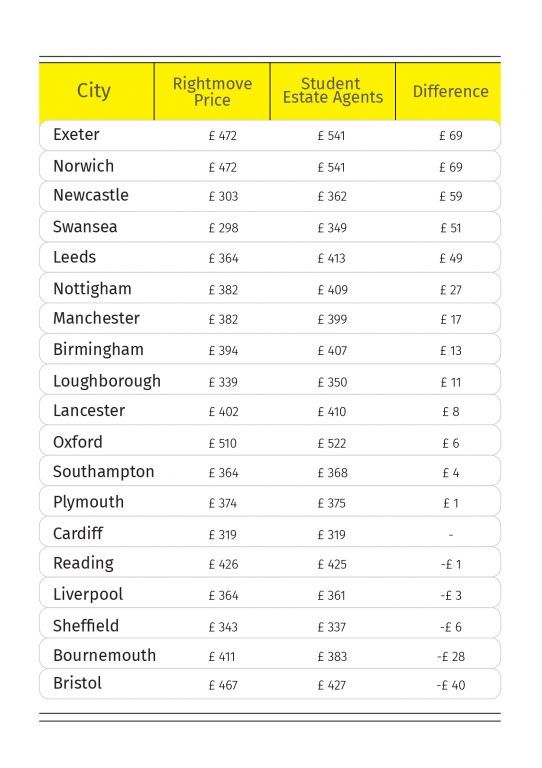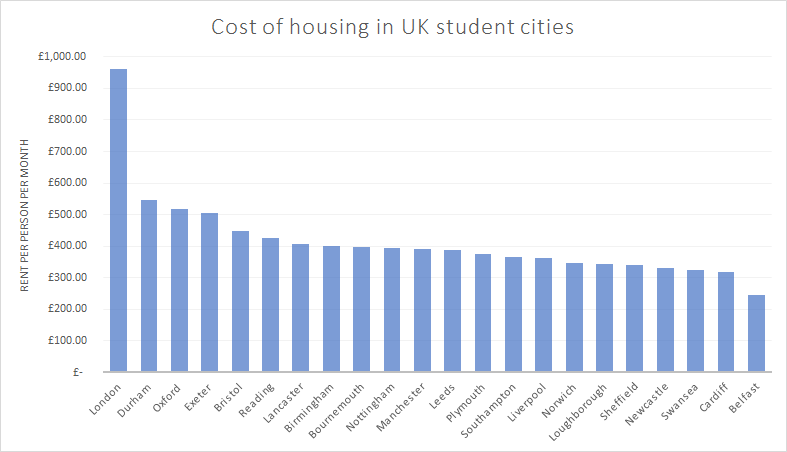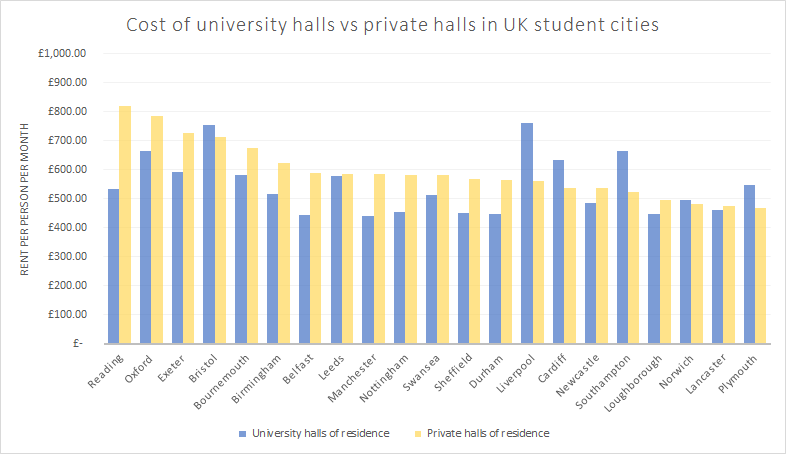Rip-off student accommodation is leaving tenants battling
housing nightmares, unaffordable rents and poor mental health, according to the
2019 National Student Accommodation Survey.
The research, conducted by advice site Save the Student,
surveyed 2,196 students in January 2019. Their responses highlight a UK-wide
scandal of overpriced and unsafe student housing, with 90% reporting a problem
with their accommodation.
While fellow residents are a top cause of complaints, the
vast majority are maintenance issues that leave student tenants without basic
services or living in unsafe conditions – despite paying an average rent of
£125 per week (£541 a month).
Portsmouth student Adele describes having to live in
shocking conditions: “On move-in day, we
found there was no door on the front of the property, then we had no heating
for two months. We had a broken toilet, broken shower and rats/mice/fleas. An
open drain in the back garden would regularly overflow, just filling the garden
with sewage.
“Got to the point
where we called in the local housing association – turns out we had no gas
certificate, no fire door in the kitchen, and even the bannisters on the stairs
were unsafe!”
Housing nightmares
like these aren’t confined to cut-price accommodation – in fact, almost as many
students report problems with university properties and commercial halls of
residence as in private rental rooms and houses.
Kerry, a student in Bournemouth, comments: “Halls were a terrible experience. Building
work almost constantly, rats, and a very irritating flatmate who was loud and
disgusting and inappropriate.”
Save the Student’s
findings are particularly relevant, as the Homes (Fitness for Human Habitation) Act 2018 came into force yesterday (20th
March 2019). The new law gives students, as well as other private tenants, a
way to take action against landlords who ignore their legal responsibilities.
The ten biggest housing nightmares for
students
- Noisy housemates (45%)
- Damp
(35%)
- Housemates stealing food (33%)
- Lack of water/heating (32%)
- Disruptive building work (20%)
- Inappropriate landlord visits (16%)
- Rodents and pests (16%)
- Dangerous conditions (5%)
- Burglary (5%)
- Bed bugs (3%)
Asking for help with
housing issues is no guarantee that anything will be done, however. Although
half (45%) of students said that problems were resolved within a week, one in
five waited more than a month. A handful (4%) said that their housing
nightmares were never resolved.
Lily studies in
Newcastle: “Last year, I had no hot water for the entire year. I had to boil
the kettle and fill up the sink that way to wash my face.”
The cost of student accommodation
The pressure to find
decent housing is so high that one in three students start looking for next
year’s accommodation in or before November – that’s just weeks after the
beginning of the academic year.
This is brutal on finances, as students pay an
average of £970 in upfront housing costs: deposit (£311), admin fees (£119) and
a month’s rent in advance (£541). The stress on students and their
parents/guardians is even greater, as the typical maintenance loan – money the
Government awards for living costs – is just £541 per month.
Housing charity Shelter deems housing affordable
when costs are no more than 35% of a renter’s income. However, with the average
student rent eating up 100% of the typical maintenance loan, tenants are left
with no money to cover their other housing or living expenses.
As a consequence, half of all students struggle
to pay the rent, while two-thirds borrow from family, banks or other lenders to
cope with housing costs.
Parents/guardians who earn enough are expected
to contribute towards university living costs. However, this latest study
uncovers the burden on family finances. Parents/guardians contribute an average
of £44 per week (£2,288 a year) to help students pay their rent, but one in
five give more than £100 a week (£5,200 per year).
Banks are the next most common source of
borrowing, with 40% of students turning to overdrafts, loans or credit cards to
find the extra cash.
Students are therefore under immense pressure to
make ends meet, yet many are rewarded with housing that isn’t fit for purpose. The
consequences include stories of damp and mould-related illnesses, plus distress
caused by money worries.
Two-thirds (63%) of students said that housing
costs have affected their mental health, while 37% said that they have had an
impact on their studies.
Mark, in Sheffield, is only part way through his
course: “I have suffered from severe
depression and anxiety at university, and have undergone counselling and CBT [Cognitive
behavioural therapy] because of it.
“My parents help as much as they can, but it is hard for me to afford my rent
and living expenses on minimum student loan when my parents are putting two
other children through university. I had a part-time job, but that, plus
studying, was too much and made my mental health worse.”
Most troubling of
all, the National Accommodation Survey shows a clear link between money and
wellbeing at university. The more rent prices exceed the financial support on
offer, the more students suffer mental and financial stress.
Jake Butler, a
Student Money Expert from Save the Student, states: “Too many people –
including students – seem to believe that poor living conditions are just a
part of student life. Our investigation confirms how students are being
unfairly treated as if second-class citizens, expected to put up with dire
conditions throughout their studies.
“It’s even more outrageous considering the sums of money being handed over to
landlords. Rent swallows up the entire maintenance loan for many students,
piling on added stress of having to make ends meet while living in squalor.”
He adds: “Whilst the laws around renting are constantly improving, there needs
to be a much easier way for students to report and resolve problems with their
accommodation.”
Kelly-Anne Watson,
the Delivery Officer for student housing charity Unipol, continues: “It’s
imperative for ourselves, universities and students’ unions to be educating
students on their rights, and to give well informed advice on housing.
“We must work collectively as a sector to improve standards and make sure that
there are a range of varied rents for students to choose from, so there are not
further barriers into education.”
She urges: “We’d encourage providers to voluntarily join one of three national
codes: UUK, ANUK and Unipol. Within a code, it is unacceptable for landlords to
ignore reported issues, such as the third of students (from this survey) who
report living with damp, or without hot water and heating.”
Landlords, if you provide student accommodation,
ensure that your tenants aren’t living with housing nightmares!








